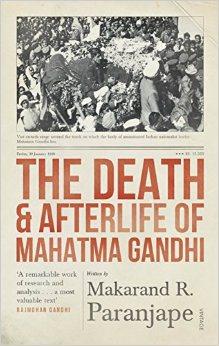 Goodreads blurb: The Death and Afterlife of Mahatma Gandhi is an explosive and original analysis of the assassination of the ‘Father of the Nation’. Who is responsible for the Mahatma’s death? Just one determined zealot, the larger ideology that supported him, the Congress-led Government that failed to protect him, or a vast majority of Indians and their descendants who considered Gandhi irrelevant, and endorsed violence instead?
Goodreads blurb: The Death and Afterlife of Mahatma Gandhi is an explosive and original analysis of the assassination of the ‘Father of the Nation’. Who is responsible for the Mahatma’s death? Just one determined zealot, the larger ideology that supported him, the Congress-led Government that failed to protect him, or a vast majority of Indians and their descendants who considered Gandhi irrelevant, and endorsed violence instead?
Paranjape’s meticulous study culminates in his reading of Gandhi’s last six months in Delhi where, from the very edge of the grave, he wrought what was perhaps his greatest miracle – the saving of Delhi and thus of India itself from the internecine bloodshed of Partition. Paranjape, taking a cue from the Mahatma himself, also shows us a way to expiate our guilt and to heal the wounds of an ancient civilization torn into two. This is a brilliant, far-reaching and profound exploration of the meaning of the Mahatma’s death.
————
For the longest time my only knowledge of Mahatma Gandhi was restricted to the Richard Attenborough biopic of the same name, and his image was immortalized in my mind by Ben Kingsley who played the role with great aplomb. This impression of mine was mostly the product of a childhood exposed only to the national broadcaster Doordarshan who would telecast the movie without fail every year on October 2nd, the birthday of Mahatma Gandhi. The first time that I was forced to relook at my ideas of Gandhi, the man, his ideals, his thought processes and his ideologies was when I saw the movie Hey Ram, scripted and directed by Kamal Hassan. Given that this movie presented the point of view of the Hindu fundamentalist who believed that Gandhi was the single cause for all the evils that the Partition of the subcontinent unleashed, this movie was quite an eye opener in more than one way.
However, this book The Death and Afterlife of Mahatma Gandhi takes the incident of the assassination of Mahatma Gandhi and dissects it in a fairly comprehensive and analytical manner. The author Makarand R Paranjape relies heavily on his academic background in psychology and uses various world renowned psychological theories and constructs such as the Oedipus Complex and the writings of various giants in the field of psychology to dissect and try to understand the compulsions and reasons that the killer of the Mahatma, Nathuram Godse might have had in his mind and psyche when he killed him in cold blood. While the first half of the book is devoted to the ‘why’ more than the ‘how’ of the assassination itself, the author takes care to ensure that a fairly balance view is presented in which he impartially tries to analyze the thought process of Godse and his accomplices, and their belief systems which dictated their actions. However, it must be said that the author fairly comprehensively debunks the reasons presented by Godse and his co-conspirators during the trial itself.
The second part of the book, and the one I found more interesting, riveting and likeable was about the ‘afterlife’ of Mahatma Gandhi. This portion deals with the last few days of Gandhi and contains a lot of excerpts from his final speeches, radio broadcasts, prayer meetings and writings during these days. Given that Gandhi spent more than three odd months in the highly charged post-partition atmosphere of Delhi where Hindus, Muslims and Sikhs were involved in large scale communal violence, most of his utterances in these days dealt with the topic. The fact that Gandhi realized that his brand of non-violence, ahimsa had in fact failed all these years and what had succeeded against the British was passive resistance rather than true non-violence was quite an eye opener for me. Further, the fact that Gandhi laments the fact that the independence of India and Pakistan which was obtained after more than a few decades of struggle against their colonial masters was now being wasted by violence caused due to the horrors of partition speaks volumes for the man himself and how true he was to his ideals of non-violence and peaceful struggle. His constant exhortations for all Indians and Pakistanis and men and women of all faiths of these countries not to resort to violence, and treat each other humanely stand testament to the fact that here was a man who was not only a Mahatma in name, but in deeds as well.
What is distressing though is the fact that today Mahatma Gandhi and his ideals are constrained to things that politicians and bureaucrats pay lip service to, hang his picture in all their offices and simply quote in public gatherings. I still have to meet anybody who believes in the Mahatma, his ideals and his ideology of non-violence in letter and spirit. It is quite obvious that we, as a nation and as a collective group of individuals have not learnt anything from the great man, and that, to me is a tragedy of reasonably large proportions.
Click here to purchase the book from Flipkart [Link] or Amazon [Link].
—————-
Disclaimer: A review copy of this book was given to me by the publisher in return for a honest and unbiased review.
